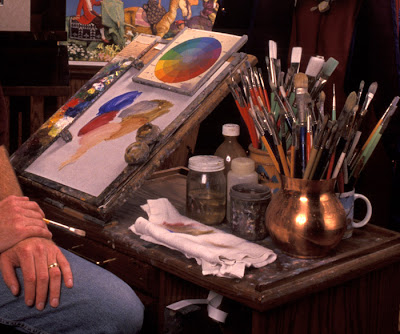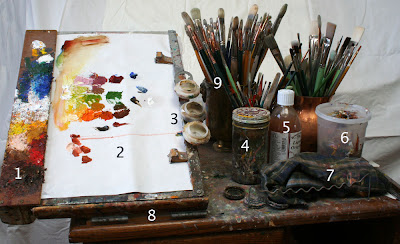 The white palette surface where I mix my paints rests on a hinged board which can can be set to any angle. If I need to refer to the color wheel (see posts on color), I can hook it above the mixing surface.
The white palette surface where I mix my paints rests on a hinged board which can can be set to any angle. If I need to refer to the color wheel (see posts on color), I can hook it above the mixing surface.
1. The blobs of paint squeezed from the tube rest on a 3x18 inch paint shelf. This is a wooden plywood surface that floats above the mixing surface.
2. I mix paints with a palette knife on a roll of standard white freezer paper, which is coated with polyethylene. The roll hangs on a wooden dowel below the paint shelf (see photo below).
3. Mixing cups with Grumtine and Liquin. Little wedges nearby hold the paper in tightly.
4. Peanut butter jar with kerosene for cleaning brushes. There’s a screen halfway down inside the jar to give something for the brush to scrub against.
5. Jar of Liquin, an alkyd based medium. It dries fast, but with a dull sheen that needs to be varnished later.
6. Plastic tub from a Chinese restaurant. I cut a rectangular hole in the lid with a mat knife. At the end of the day I scrape down the paints on the paint shelf using a palette knife, and the scrapings go in here. When it’s full, I dispose of the whole tub.
7. Paint rag with a wiggly wire to hold the brush handles. This is where brushes sit while they’re in use.
8. Note the door hinges under the mixing panel. This allows the whole panel to be raised up. Unseen beneath the hinged panel, is an adjustable sliding clamp that fixes the slope at any angle.
9. Brushes are mostly bristles and white nylon flats.

Here’s how the freezer paper fits under the edge of the tip-up palette. Fresh paper unrolls with the plastic side up, and constantly gives a new surface for mixing. The used paper tears off on the right of the palette.
In drawers below are pencils, pens, markers, paints, and mediums.
The whole thing is on wheels, allowing it to roll around.
Tomorrow: Downfacing Planes

Thanks for sharing a view of your taboret James. I have been wanting to ask you this for a while. Why do you like to mix on white? I have seen you put the white into your open box too. Is it to see the transparent color? I always mix on a neutral mid tone to judge values.
ReplyDeleteAlso, you mentioned Liquin. I have started using it and like it. I have heard from several people lately that it is very toxic and carcinogenic. I had never heard that before, but I am sometimes out of the loop down here. Any thoughts on that?
Thanks for the views and explanations.
ReplyDeleteFor those of us starting to learn the process, this is like GOLD.
Sweet, sweetness. Thanks Jim. I am definitely going to use the freezer paper dispenser, I am so tired of cleaning my old palette. By the way I dig the new shades that you have. Pretty dang swank.
ReplyDeleteThanks for sharing.
Freezer paper is the best palatte I've ever used.
ReplyDeleteAlso, aluminum foil is fantastic if you want to save a color that you mixed up- a lifesaver to avoid wasting paint at the end of a session.
Thanks for the info!
I always find it fascinating to peer into the professional studio, and to see what tips and tricks are up their sleeves. It's always a treat, thanks for sharing!
ReplyDeleteAlways great to see workspaces so well thought out like this! Thanks a lot for sharing. I'd love to hear your thoughts on the white palette as well. I'm sure you've worked on a variety at this point. Are there other disposable/roll idea's you've tried. Thanks again!
ReplyDeleteAwesome! Are all your tool homemade?!
ReplyDeleteSo, it is true then.
ReplyDeleteAll oil paint artists have a greasy corner.
It's I think the first time we see the one of James Gurney, but sure enough, he has one too !
Just like my father, also an oil paint scribbler.
Ah, I still remember those days at our house when he used to stand painting in the living room, being driven by loud classical music, making virtually any family conversation impossible.
Ah, and that smell of terpentine and linseed oil.
Well...the classical music stuck...but the greasy paint and it's smell sure didn't !
Hurray for the invention of acrylics !!!
I could show you a picture of my working place, but there's nothing to see there really : it's so clean that it's hardly artistic.
;)
Now if I had to divide painters in two groups...guess how I would divide them...
Frank and Mark: You're right--I mix on white so I can see transparent mixtures more easily. White can give glare in full sun outdoors, but with a white umbrella, it works OK. A friend of mine uses wood-grained plasticized shelf-lining paper for a palette, but I have a hard time judging mixtures on dark colors. Haven't heard of safety warnings about Liquin.
ReplyDeleteThanks, Emilio and Matt. Amy, I appreciate the foil tip. To save mixtures I sometimes tear off the section of freezer paper, tape it to a piece of cardboard, and put it in the freezer--or outside in winter.
Pennington: Yes, all homemade, and not fancy. I should have added that the palette unit is a separate piece that lifts completely off the tilt-up panel.
Yes, Eric, I admit that love the "greasy kids stuff," and the palette is only one corner of my messy studio. And I share your father's love of loud classical music, especially Rimsky-Korsakov's Scheherazade when I'm painting waves in the ocean or Bach when I'm painting architecture.
Very cool, thanks for sharing this! And thanks for the advice from Line And Wash, I put together based on yours and your wife's advice. Please thank Mrs. Gurney for me, I have an amazing travel kit now. I love my travel brush!
ReplyDeleteThanks so much for sharing you setup. I've yet settle on one that's convenient for me. I want to ask how you keep you brushes clean. I just use Gamblin, and tries to clean as well as I can, but the bristles get stiff pretty quickly. Is there a process you go through to preserve it longer?
ReplyDeleteBao: my brushes have the same problem as yours. I scrub out the paint as well as I can with kerosene and the paint rag, and then wash them with Ivory soap and warm water in the sink. But no matter how careful I try to be, they eventually get stiff and lost their painting edge. Maybe someone else can advise us both.
ReplyDeleteEric, have fun with the line and wash setup!
I've enjoyed the past few posts. Really insightful and fun. Thanks.
ReplyDeleteInteresting use of freezer paper.
ReplyDeleteI use a wood palette and glass my self. With a gray tone at value 6.
Some people have had problems with delamination with Liquin, but some do not. I personally don't use it as I am allergic to whatever is in it.
Studio Products sells a brush soap called Ugly Dog which is the best product I have ever used for cleaning bristle brushes.
Olive oil soap is good to, after I wash them I hang them upside down or lean them in that direction until dry so the water will run out of the ferruls keeping them from loosening.
I have been reading your book "Imaginative Realism" and it so helpful that you have put some of the things you talked about in the book on your site with more pictures. This particular Taboret part of the book was confusing when you were talking about the wax paper. Now I get it. Thanks
ReplyDeleteAlso, aluminum foil is fantastic if you want to save a color that you mixed up- a lifesaver to avoid wasting paint at the end of a session.
ReplyDeleteCarisoprodol
This comment has been removed by the author.
ReplyDeleteNot sure if you get alerts for comments to old posts, but here goes. Can we get a photograph of the taboret from behind? I'd love to see the adjustable sliding clamp to try to reproduce it.
ReplyDeleteStevo, yes, I do get alerts on old posts:
ReplyDeleteThe taboret is held up with a piece of furniture hardware called a "friction lid support." If you see the item in the hardware store, it should be pretty self evident, but I'll try to do a post showing it in the future.
I'm making one of these to fit on top of my ALEX from Ikea...
ReplyDeletehttp://tinyurl.com/7mtf84f
Such a great idea :).
Did you make the taboret or purchase it? Trying to find just this thing!! Thx in advance.
ReplyDelete